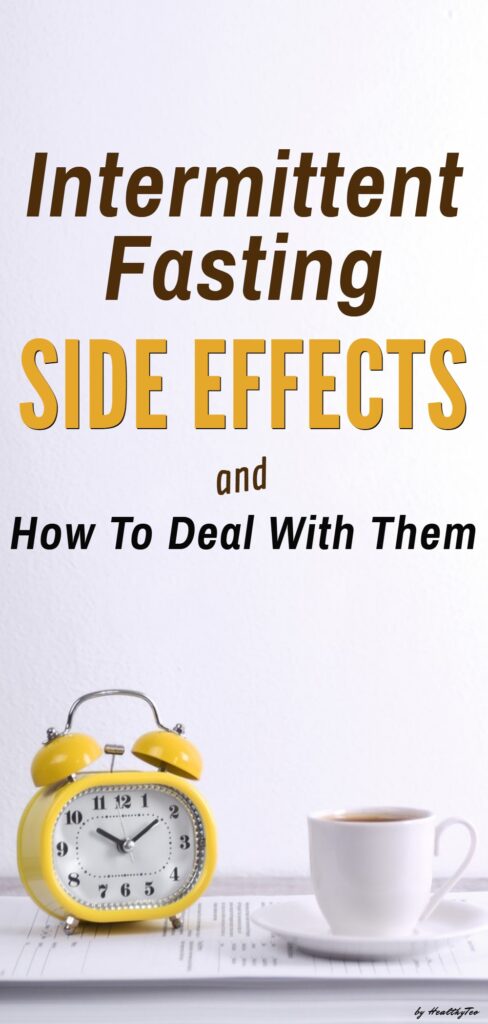Dangerous effects of intermittent fasting according to evidence and fasting practitioners
Potential side effects of intermittent fasting such as hunger, cravings or headaches, and low energy are common for beginners with this type of eating.
These are just some of the negative effects of fasting that usually occur during the beginning of your fasting period and especially if you are a beginner.
We know about the benefits of intermittent fasting but if you are making changes in your diet and want to practice some of the intermittent fasting methods it is good to know what are the potential side effects and what to expect.
The purpose of this article is to introduce you to the side effects of intermittent fasting but not just that, you will learn how to deal with them. Further, find out who should not practice intermittent fasting, and are you one of those categories of people?
We are sure that this eating pattern is very beneficial if followed properly and we have an article for the benefits of fasting for 24 hours. But you must know that there are some other effects on your body that you should be aware of.
It is up to you with the consultation with your doctor to decide if intermittent fasting is for you or not!
This post may contain affiliate links, which means we may receive a small commission, at no cost to you, if you make a purchase through a link. For more information, please see our disclosure.
Intermittent fasting side effects
The side effects of intermittent fasting that will be presented here are evidence-based and from the experiences of intermittent fasting practitioners. You should know that most intermittent fasting practitioners experience these side effects.
Some of the side effects are short-term and maybe won’t occur while you practice intermittent fasting but if you’re a beginner in fasting you should be aware of them.
Before we start with the potential risks of intermittent fasting you should be aware that intermittent fasting has huge benefits.
If you’re a beginner with this type of eating we’ve prepared an interesting reading for you where you can find out what is intermittent fasting, how to start practicing it and what are the benefits of fasting.
If you visited and read it previously mentioned article you’ve read some major side effects of intermittent fasting, but here we will go deeper and find out the potential risks and dangers of intermittent fasting when starting and what to do about that.
Hunger and cravings

Maybe the most common side effect related to intermittent fasting especially for beginners – hunger. You’re used to eating 4 or 5 times a day and your body comes to expect food at certain times.
The hormone responsible for making us feel hungry is ghrelin often called a “hunger hormone”. This hormone typically peaks at breakfast, lunch, and dinner time and is partially regulated by food intake.
When you start fasting, ghrelin levels will continue to peak and you’ll feel hungry. The first three to five days may be the worse, and you’ll need serious willpower to continue with your IF schedule.
After a while, there will come a time when you reach the beginning of your eating window and you don’t even feel hungry!
A study from 2019 examined 1,422 people who participated in fasting regimens lasting 4-21 days. The results showed that many of the participants tended to experience hunger symptoms only during the first few days of the regimens.
So, hunger will occur naturally in the first few days but as your body adapts to fasting periods symptoms like hunger may resolve.
How to combat hunger during the first few days? – Drinking water will keep your belly full, and also help you feel more alert. Within 30 minutes of waking up drink a glass of water, and when you feel a pang of hunger drink another glass of water or more.
Distractions are also helpful. Going for a walk, engaging in a conversation are some activities that can help.
One thing that intermittent fasting will teach you is that what you thought was hunger was probably thirst or boredom.
Headaches
Headaches are another most common negative effect of intermittent fasting. Most people complain of mild headaches during the first few days of fasting protocols.
A review from 2010 shows that fasting headache is usually diffuse or located in the frontal region, and the pain is non-pulsating and of mild or moderate intensity.
Interestingly in this research is noted that people who commonly get headaches are more likely to experience headaches during fasting than those who don’t.
In most cases, the headache occurs after at least 16 hours of fasting and resolves within 72 hours after resumption of food intake. The likelihood of developing a fasting headache increases directly with the duration of the fast.
Main reasons for headaches during intermittent fasting: Dehydration can be the number one factor but headaches can also be caused by low blood sugar, caffeine withdrawal, and stress hormones released by your brain while fasting.
How to deal with headaches during intermittent fasting?
Make sure to drink a lot of water during your fasting and eating window and try to remain as stress-free as possible. To try and avoid drops in blood sugar make sure to not skip meals during the eating window.
Eat more calories from high-quality fats during your meals so your body doesn’t use sugar as much for fuel.
If you’re fasting for longer periods of time it may be useful to start cutting out caffeine before you start your fast. Going completely without caffeine may put you into caffeine withdrawal and cause headaches.
Cut back on caffeine gradually and for this purpose, you can use some coffee alternatives. If you don’t know what to drink instead of coffee here is an interesting reading for you that will help: Best Tea Alternatives To Your Morning Coffee With and Without Caffeine.
Bad breath
The unpleasant side effect of intermittent fasting that can occur in some people is bad breath. While not everyone who fasts will experience this side effect for those that do they shouldn’t be worried.
This is caused by a lack of salivary flow and the rise of acetone in the breath. Acetone is a by-product of fat metabolism, so it increases in your blood and breath during fasting.
When we eat food throughout the day our body uses glucose for energy. When we fast our body is using different energy systems. These are our body’s fat stores which are there in case of famine.
When fasting your body can enter a state of ketosis, which is a process of breaking down fat for energy. This process releases ketone bodies which are gaseous compounds that produce an odor. Further, dehydration can cause dry mouth which may lead to bad breath.
How to avoid bad breath during intermittent fasting? – Stay hydrated, get regular professional cleans, light-tongue scraping, flossing, chewing sugar-free gum to promote saliva, you can also drink peppermint tea without sweeteners of course during your fasting window.
Constipation and other digestive issues
Digestive issues such as diarrhea, constipation, bloating, and nausea – are symptoms you might experience if you practice intermittent fasting. While you’re fasting you’re reducing food intake and that may negatively affect your digestion, causing constipation and other side effects.
Further, changes in diet associated with intermittent fasting programs may cause diarrhea and bloat.
Constipation – Every change in diet can cause changes in bowel movements. When it comes to intermittent fasting people may suffer from constipation as a result of poor dietary fiber intake or dehydration.
Think of this: You’re eating less because your eating window is limited, there is a good possibility you aren’t getting enough nutrients to keep your bowel movements regular.
Especially if you’re not getting enough dietary fiber which helps your digestive system function properly. Fiber adds bulk to your stool and helps food passing through your digestive tract with ease. So if you aren’t getting enough the result can be fewer toilet flushes.
The same goes for not getting enough water or other fluids. If you aren’t hydrated that can make it even harder for your stool to pass because fiber is effective if you’re getting enough fluids in your diet. The less water you take in the higher risk of constipation.
Constipation generally means you’re having fewer than three bowel movements in a week or 3 or more days without a bowel movement. So how to overcome if this digestive issue occurs while fasting?
How to deal with constipation during intermittent fasting?
You can overcome constipation while intermittent fasting by drinking more water during the non-fasting time and eating more fiber-rich foods.
It’s recommended that active individuals should get 25 to 35 grams of fiber per day. The recommended daily water intake should be 3 to 4 liters per day. Fiber and water are key for helping your stool moving.
Also, get active, physical activity stimulates bowel motility. Further, drinking coffee can often cause the urge to have bowel movements after a short period of time. Just don’t forget your coffee should be black, calorie-free without sugar or other sweeteners to keep your fasting window compliant.
Mood changes and irritability
If you’re an intermittent fasting beginner you should expect to feel a little cranky when your blood sugar levels drop or when you deal with other side effects of intermittent fasting like low energy or cravings. When your blood sugar level is low, it may cause you to feel irritated.
During periods of fasting low blood sugar can occur and this can lead to anxiety, poor concentration, or irritability.
A 2016 study about the psychological effects of short-term fasting in healthy women, showed that participants were significantly more irritable during an 18-hour fasting period than during a non-fasting period.
You can deal with this by avoiding people and situations that might make you more annoyed and focusing on doing things that make you happy.
Further, if you’re feeling anxious, down, or discouraged about IF it’s good to stop and get in touch with a registered dietitian or nutritionist. They may help you to create a fasting schedule that better suits your mind and body.
You may experience nutrient deficiencies
While fasting you’ll consume fewer meals throughout the week, so it’s difficult to consume the adequate amounts of macro and micronutrients that your body needs.
If you don’t practice or plan your fasting program carefully you might experience malnutrition along with other health complications.
To avoid this issue make sure to consume a well-rounded, nutritious diet while practicing intermittent fasting. Also, make sure you never overly restrict your calorie intake.
Low energy and fatigue

Low energy and fatigue are common side effects of intermittent fasting especially in the first couple of weeks. Your body is not getting the constant source of fuel you used to get from eating all day long, so you should expect to feel a little sluggish.
This is backed by science, studies show that some people practicing different methods of intermittent fasting experience low energy and fatigue.
However, there are some opposite studies that show that intermittent fasting can reduce fatigue, but this may happen after your body becomes adapted to regular fasting periods.
To deal with this issue, try to keep your days as relaxed as possible so you can exert the least amount of energy. You can also do light exercise like yoga or walking, and getting extra sleep may also help.
It may lead to overeating during the eating window
At the beginning of their intermittent fasting journey, people tend to overeat during their feeding time. As your body tries to make up for all of the energy it has missed during the fasting period, you may find yourself eating larger portions than you have in the past.
This can result in a lack of weight loss and a lack of calorie deficit.
Planning your meals ahead can keep portions in check. When your eating window starts try to be mindful about your first meal, start with something lighter like salad and then go on to your main meal.
Who should not fast?
People who should not practice intermittent fasting:
Individuals who are underweight, struggling with weight gain
This category of people have higher calorie needs, and should not fast as they need sufficient calories on a daily basis for proper development.
If you are at risk for an eating disorder
Individuals who are susceptible to an eating disorder should not undergo any diet associated with fasting. Fasting may trigger a relapse of these disordered eating behaviors.
Women who are pregnant, breastfeeding or trying to conceive
Breastfeeding and pregnancy increase the mother’s nutrient needs, and fasting can result in failure to meet those needs.
Individuals who take diabetes or blood pressure medications
Anyone with type 1 or 2 diabetes who takes medications that lower blood sugar may be at risk of low blood sugar levels when fasting. Further, some people may find their blood pressure drops too low when fasting.
The effect of fasting on blood pressure is much lower than the effect of blood sugar, so if you have these issues it is better to avoid intermittent fasting.
Children and adolescents
Children and adolescents need a steady supply of nutrition and energy, so they should avoid fasting. Overweight and obese children should focus more on healthier eating patterns than on fasting.
Good to remember
Before you go on a new diet or you want to practice one of the intermittent fasting methods ask your doctor if it’s a good choice for you. You can also ask a registered dietitian who can show you how to design a healthy eating plan.

Final words for the possible negative effects of intermittent fasting
If you’ve never tried intermittent fasting before you should know that besides benefits there are some side effects that you should expect from fasting. We hope that this article gave you a good insight into what to expect if you decide to practice intermittent fasting.
You may or may not experience the side effects presented above here but it is good to know them.
Even intermittent fasting is generally safe and beneficial for you, if you can’t stay up to the plan and follow the eating and fasting period don’t punish yourself. There are other ways to lose weight and improve your health.
If you decide to make a change and start practicing intermittent fasting it is always a good idea to consult your doctor or nutritionist to check if it’s a safe and appropriate choice for you.
Disclaimer: All the information on this website is for educational purposes only. Nothing on this website should be considered as health or medical advice. Always consult with a doctor or trusted health professional before following any dietary, nutritional, or herbal recommendations.




